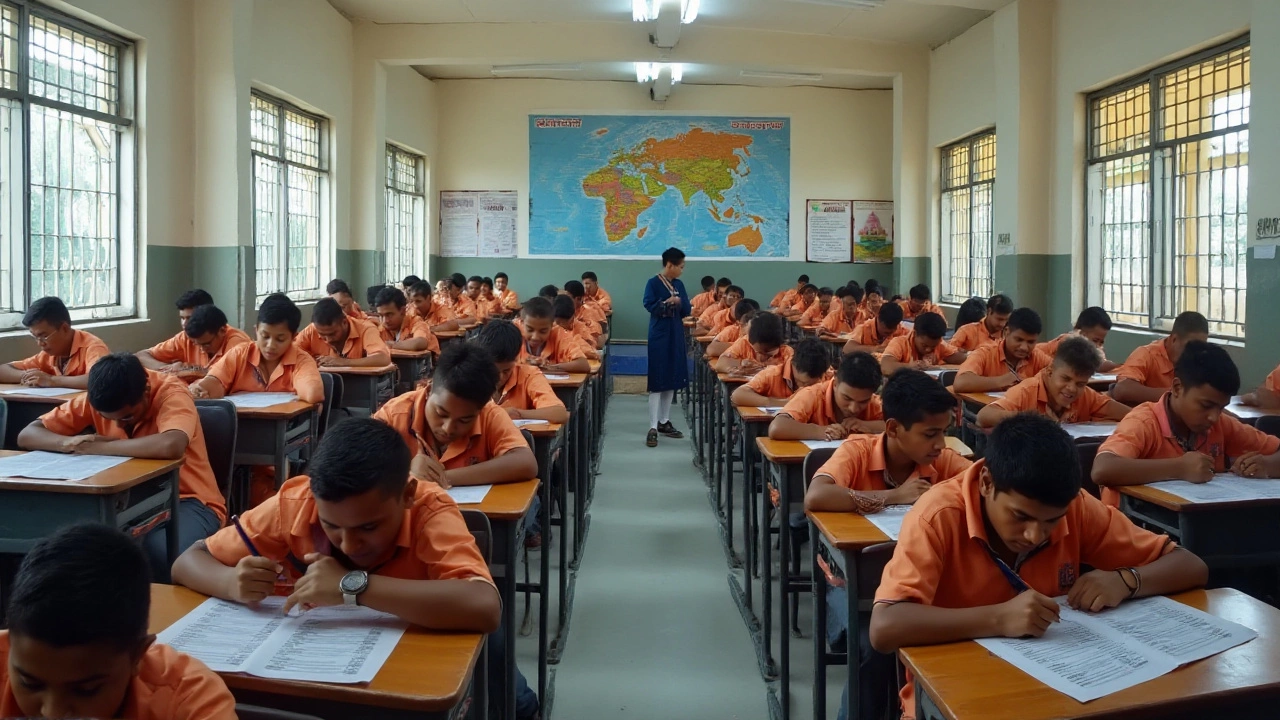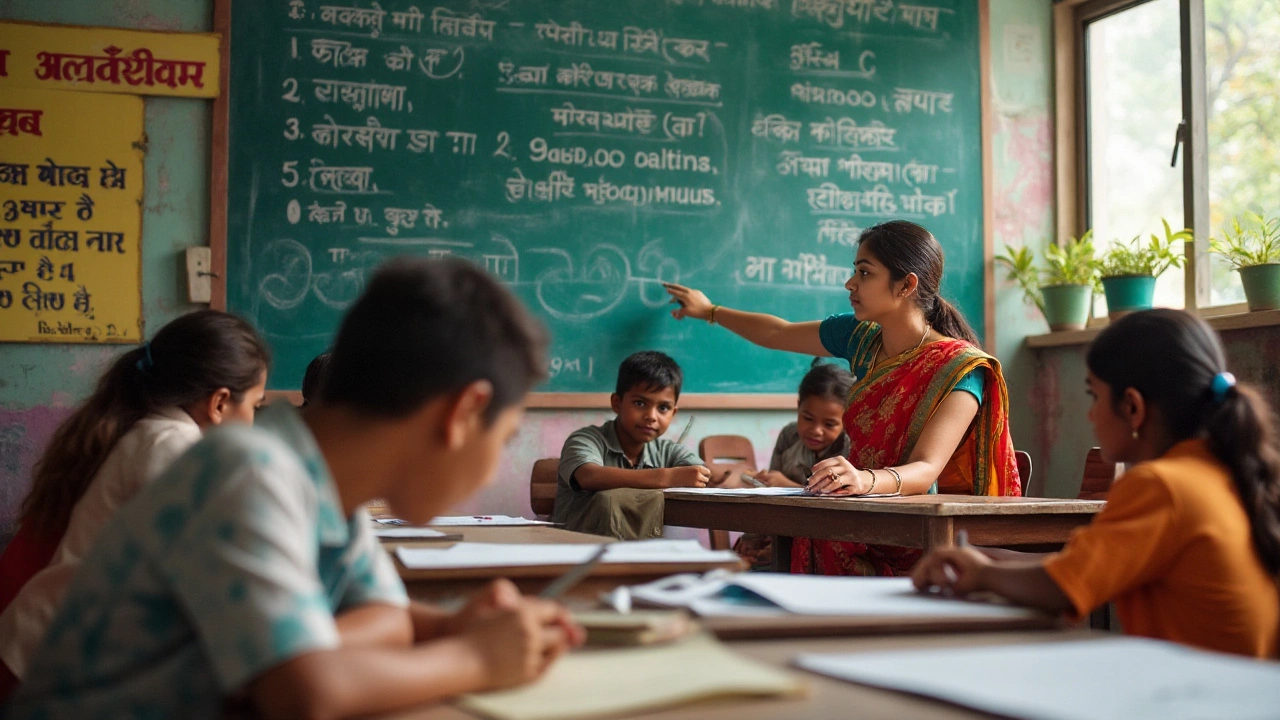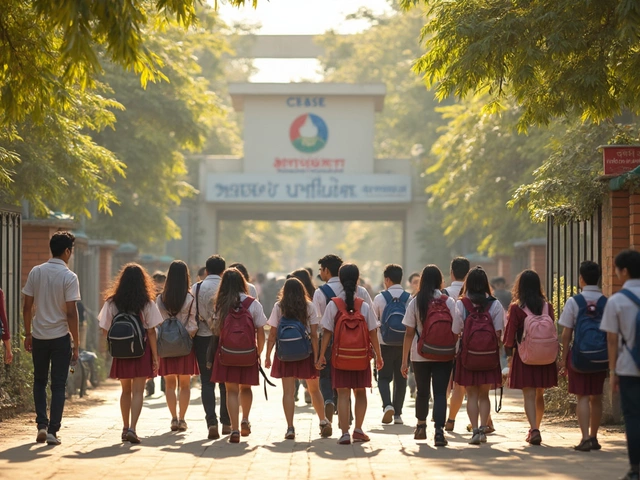In India, the Central Board of Secondary Education (CBSE) stands as a beacon of uniformity in an educational landscape that is as vast and diverse as the country itself. For students preparing for these exams, there is always a lingering question—are CBSE papers the same all over India?
This query springs from the curiosity about how a central educational board could maintain consistency, fairness, and impartiality in its examinations for the millions who take them annually. An exploration into this reveals intriguing insights about the design and execution of these exams.
From the creation of the question papers to their distribution across various states, a multitude of factors are carefully orchestrated to ensure that every student, regardless of their geographical location, receives an examination experience that balances uniformity and educational rigor.
- Introduction to CBSE Exams
- The Centralized Examination Process
- Factors Affecting Paper Uniformity
- Why Consistency is Crucial
- Preparation Tips for Uniform Exams
- Impact on Students and Learning
Introduction to CBSE Exams
The Central Board of Secondary Education (CBSE) is among India's most prominent educational boards, responsible for standardizing the curriculum in thousands of schools nationwide. Each year, millions of students across India sit for CBSE exams, striving to demonstrate their understanding and mastery of a uniform syllabus. The board's exams are seen as a benchmark for educational excellence, structured to evaluate students’ comprehensive knowledge base in core subjects like Mathematics, Science, and English, setting a robust foundation for their future academic pursuits.
Established in 1962, the CBSE aims to provide a balanced and holistic education that doesn't just emphasize rote memorization but encourages analytical thinking and practical skills. The exams are designed to test not just the students' memory of facts and figures but also their understanding of concepts and their ability to apply this knowledge in real-world scenarios. This approach reflects CBSE's commitment to fostering a well-rounded educational experience, preparing students not just academically but also readying them for diverse opportunities that lie beyond school. Reflecting on the board's approach, an educational expert once stated,
"CBSE examinations are designed not just to test your abilities but to enhance your understanding on a global scale."
The uniformity of the exams implies that each student, whether in a bustling metropolis or a remote village, faces the same questions, ensuring a level playing field. This standardization is significant, given the diverse educational environments across different regions in India. It's an endeavor to bridge the educational gap, bringing a single standard of education accessible to all. Over the years, the perception of CBSE exams has shifted, now seen as a launching pad not just for higher education but as a gateway to prestigious national-level entrance exams such as the Joint Entrance Examination (JEE) and the National Eligibility cum Entrance Test (NEET). CBSE exams foster a spirit of competitiveness and strive to mould individuals prepared to tackle complex challenges in their academic and professional pursuits.
Through these exams, students not only gain qualifications but also develop critical thinking and problem-solving skills necessary for survival in a competitive academic and professional environment. With schools across India affiliated with the CBSE board, the exams play a crucial role in shaping the educational landscape of the nation, aiming to equip students with the skills they need for their future. This uniform examination system is recognized for its high standards and comprehensive nature, ensuring that students are well-prepared for both life and higher education. Nationwide papers ensure that every student receives the same material, regardless of where they study, contributing to the idea of a common standard of knowledge universally tested.
The Centralized Examination Process
The CBSE exams operate on a centralized examination process that is meticulously designed to maintain standardization and uniformity across the nation. This involves several crucial steps, starting from the creation of the question papers to their final distribution to examination centers all over India. The entire process is governed by stringent protocols to ensure fairness and balance in the evaluation of all students under its purview.
Every year, the Central Board of Secondary Education assembles a team of subject experts and educators who are responsible for drafting these examination papers. This team works under a veil of confidentiality to prevent any leaks or unfair advantages. These experts are drawn from various parts of India, ensuring a blend of educational insights that foster a balanced paper-setting approach. Known for its rigor, this process is key in providing all students an equal opportunity to succeed, no matter where they reside.
"The Central Board's efforts in maintaining a unified exam pattern have become a cornerstone for educational consistency," notes a well-respected educational analyst.
Upon finalizing the questions, the papers undergo a thorough vetting process. This review is performed by another set of educators who check for conceptual clarity, difficulty levels, and applicability. The CBSE aims to ensure that each question is aligned with the syllabus and reflects the curriculum's objectives. By doing so, the Board upholds its commitment to delivering quality education uniformly.
Once the papers are ready, the next phase involves logistical operations. The distribution of these papers is a massive undertaking in itself due to India’s size and diversity. Yet, through a well-coordinated system, CBSE administers this task with precision. Each center receives the papers securely and timely through a network that intertwines technology and tradition, ensuring the integrity and secrecy of the examination.
The impact of this centralized system extends beyond logistics. It ensures that all students are evaluated against the same yardstick, leveling the playing field. This uniform assessment helps in maintaining a standard educational benchmark across the educational spectrum in India. With every passing year, CBSE refines its processes by embracing the latest technological advancements and expert advice. This continuous evolution points to CBSE’s dedication to educational excellence and equity.

Factors Affecting Paper Uniformity
When it comes to maintaining the uniformity of CBSE exam papers across the length and breadth of India, several pivotal factors come into play. First and foremost, the centralized blueprint approach ensures consistency. At a strategic level, a dedicated committee, composed of seasoned educators and experts, meticulously outlines a common syllabus. This strategy not only aligns the intellectual objectives across the board but also ensures that each paper developed under its guidance meets predetermined standards of fairness and difficulty.
Another crucial factor in ensuring uniformity is the advanced level of secrecy and security surrounding the question paper formulation process. The paper setting remains a highly confidential task, conducted under strict surveillance to avert any potential leaks that might compromise the integrity of the exams. The CBSE's system of rotating paper setters and limiting access to the draft papers is a move towards defeating predictability, which could otherwise skew the intended uniformity.
Geographical diversity within India poses its own set of challenges. Despite this, the CBSE endeavors to ensure uniform accessibility to educational resources, a fundamental aspect aiding in maintaining uniform paper standards. The board actively distributes a host of preparatory materials, practice papers, and guidelines that harmonize the preparation process irrespective of location. This effort reduces discrepancies and ensures every student has a fair chance at performing their best.
The role of technology cannot be overstated. The digitally-coordinated logistics ensure that the question papers reach the respective centers simultaneously, maintaining the exam's synchronous nature nationwide. This technologically driven distribution mechanism is crucial in bridging any temporal gaps that might otherwise occur due to India's vast expanse. An interesting quote from The Times of India emphasizes this technological facet:
"The digital prowess of CBSE ensures its exam materials traverse a billion hearts with clockwork precision."
Statistical moderation by the CBSE also holds a key role. Post-exam evaluations often involve statistical approaches to normalize results, ensuring no student batch faces undue advantage or disadvantage due to paper difficulty. The moderation teams, equipped with cutting-edge analytical tools, diligently assess all potential deviations.
In addressing evolving educational paradigms, the emphasis on real-life applicability and competency-based learning influences paper creation and its consistent philosophy. By focusing on cultivating analytical, rather than rote, skills, it aligns paper content appropriately to mirror real-world challenges and skills. Thus, teachers across the nation are encouraged to tailor their methodology to ensure students are not only scoring well but are also well-prepared for life after exams.
Why Consistency is Crucial
Consistency in CBSE exams is critical not just for maintaining fairness, but for ensuring that the educational standards across India are upheld. Imagine a scenario where the difficulty of examinations varied drastically between different regions; this would inevitably lead to disparities in assessments and could unjustly affect a student’s future prospects. With over two million students appearing for the CBSE examinations each year, uniformity is more important now than ever. This consistency helps in creating a level playing field, where every student, regardless of their state or city, faces the same level of challenge, ultimately enabling fair competition.
Maintaining uniform exam standards allows higher education institutions to gauge students’ potential accurately. With colleges relying heavily on scores from exams such as the CBSE, having a consistent exam pattern is a reflection of student's abilities on a national scale. This eliminates any bias that may arise from regional differences in exam difficulty and nurtures a trust in the grades presented by applicants. Indeed, the system’s robustness has been acknowledged by numerous educational experts and institutions worldwide.
An interesting component of this consistency is how it mirrors real-world situations. Life does not cater to easy and hard paths based on location; thus, students learn early on to prepare for uniform challenges. This preparation helps build resilience and adaptability, which are essential traits in today’s ever-changing world. For example, the skills cultivated in standardized test preparation are often cited by employers as critical to workplace success.
“Consistency in educational assessment is foundational to ensuring equity in educational opportunities and outcomes,” noted Dr. R. Kumar, an esteemed education strategist. “By offering identical challenges, CBSE promotes an inclusive environment where every student competes on merit.”
Moreover, uniform curriculum and exams foster a sense of national identity and cohesion. As students across India learn the same material and face the same tests, it creates a shared educational experience that transcends regional and cultural differences. Such shared experiences often form the basis for a unified community that appreciates and values collective growth.
It's important to underscore that achieving this level of consistency in examinations requires an enormous effort from the CBSE. Resource allocation, adherence to meticulous schedules, and the dedication to crafting fair question papers are just a few of the logistical challenges that must be overcome annually. Yet, this unwavering commitment to uniformity ensures that each year, CBSE can hold its head high as a credible and prestigious educational system. Ultimately, this consistency is not just advantageous but crucial for the sustained success and reputation of education within India.

Preparation Tips for Uniform Exams
Preparing for the CBSE exams, which are known for their uniform nature across India, demands a strategic approach that combines dedication, time management, and a keen understanding of the syllabus. The belief that sheer hard work alone will suffice is a misconception; instead, the focus should be on smart work, using every available resource to understand the subjects in depth. A good starting point is to thoroughly familiarize yourself with the exam pattern by reviewing previous years' question papers. This practice can provide valuable insights into the weightage of different topics, allowing students to prioritize effectively during studies.
Next, the importance of a well-structured timetable cannot be overstated. It's crucial to create a study schedule that allocates time based on subjects' difficulty levels and your proficiency in them. The timetable should balance study with adequate breaks to prevent fatigue and maximize retention. Consistency in following this plan is key to covering the entire syllabus systematically. Moreover, understanding the core concepts rather than rote learning can significantly boost performance. Engaging with the material through varied sources, such as reference books and online resources, can aid in grasping the practical applications of theoretical knowledge.
Additionally, practice is your best ally. Regular mock tests and sample papers under timed conditions enhance your ability to manage time during the actual exams. They not only help in evaluating your preparation but also improve speed and accuracy. Another beneficial practice is summarizing each topic in your own words, which reinforces learning and helps retain information longer. Group studies can also be effective, as they encourage the exchange of ideas and clarify doubts through discussion.
Stress management techniques such as meditation, light exercise, and hobbies should not be neglected in the pursuit of academic excellence. A healthy body feeds a productive mind, hence maintaining a balanced diet is essential during exam preparations. Rest is equally critical, as sleep deprivation can impair cognitive functions and reduce efficiency.
"Examinations are formidable even to the best prepared, for the greatest fool may ask more than the wisest man can answer." - Charles Caleb Colton
Incorporating these elements into your routine can transform an arduous study process into a more manageable and potentially enjoyable experience. Embracing a holistic approach ensures that you aren't merely preparing for exams but are also nurturing a lifelong learning habit that will serve you well beyond India's education system. Remember, perseverance is not a long race; it is many short races one after the other.
Impact on Students and Learning
The uniformity of CBSE exams across India plays a significant role in shaping the educational experience for students. These standardized papers mean that everyone, regardless of where they are sitting, faces the same challenges and opportunities, promoting a sense of equality and fairness. For students, this sense of uniformity can alleviate concerns about regional disparities affecting their results. However, it also places immense pressure on them, as the competition is on a national scale. Knowing that the same paper is presented to students from diverse backgrounds, including both metropolitan and rural areas, encourages young learners to aspire to a level playing field in academic achievement.
Another impact of having a consistent examination system is the disciplinary academic adherence it instills in schools across the country. CBSE-affiliated schools are urged to follow the same syllabus and teaching methodologies, thereby ensuring that no student is at a disadvantage due to their educational environment. This contributes to a consistent quality of education, although it can sometimes stifle creativity in teaching methods, as educators focus on standard outcomes rather than innovative approaches.
The experience of preparing for these nationwide examinations also encourages self-study among students. Since all are working towards tackling the same nationwide papers, students tend to seek resources and peer connections beyond their immediate environment, often engaging in online forums and study groups where they exchange ideas and learning materials. This not only broadens their understanding but also enhances their social interaction skills, often outside their immediate peer group.
Moreover, the CBSE's uniform examination system propels a certain degree of academic mobility. The consistency across the country makes it easier for students to relocate without losing educational momentum, a factor important in an increasingly globalized world. It also helps in providing fair and standardized assessment criteria, which are crucial for university admissions both nationally and internationally. Students’ performance is evaluated against nationwide peers, thus reflecting a broader scale of meritocracy.
Given this framework, the importance of maintaining both fairness and academic rigor is widely acknowledged. “Education is not the learning of facts, but the training of the mind to think,” as Albert Einstein famously stated, aptly summarizing the broader objectives of standardized exams, which aim to cultivate critical thinking along with factual knowledge. This resonates within the CBSE system where the examination is not merely a test of memory but a probe into their analytical and comprehension abilities, which are crucial beyond school walls.
In essence, while the advantages in terms of equality and fairness are clear, the stress and pressure associated with such competitive exams must be acknowledged. Students may find themselves under immense pressure to perform well, impacting their mental health. Schools and parents, therefore, need to balance academic rigor with adequate support systems to ensure students' well-being is not compromised.


